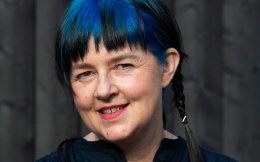
Ruth Catlow
Co-Director - Furtherfield
Role-play for more-than-human decision-making [Panel Talk]
I will talk about how participation in scenarios with more-than-human characters in live action role play (LARP) leads to powerful group-driven discovery. I will focus on The Treaty of Finsbury Park 2025 building empathy pathways and real-world impacts in urban green space. This Larp is a collaborative project that depicts the story of the dawning of interspecies democracy. It’s a new era of equal rights for all living beings, where all species come together to organise and shape the environments and cultures they inhabit, in urban green spaces across the UK, the world, and beyond!) Diverse real world stakeholders play from more-than-human perspectives to encourage the blooming of a bountiful biodiversity and interspecies political action. This is offered as a way of exploring how we might relate to and care for life forms here differently. By playing together as other species we prepare ourselves to help shape a treaty of interspecies cooperation.
Note this talk will be part of the More-than-Human Design panel running between 1:40-2:40pm in room B104
About the speaker:
Ruth Catlow is an artist, researcher, curator and Co-Director of Furtherfield. She leads experiments with decentralised systems for fairer and more connected cultural ecologies and economies. Projects include Larps for planetary-scale interspecies justice and the CultureStake app for collective cultural decision-making using QV on the blockchain. She is Co-PI at the Serpentine Galleries Blockchain Lab and co-editor of ‘Radical Friends – Decentralised Autonomous Organisations and the Arts’ with Penny Rafferty.
About the More-than-Human Design panel
This panel on More-than-Human Design will include short presentations from four speakers who focus on moving beyond human-centered perspectives in their work, as part of a response to ecological concerns. From academia, to industry and art practice, speakers will present different projects that show the diversity of possibilities for more-than-human design in different contexts. Following the presentations there will be a panel discussion to further probe the different methods for more-than-human design, and explore some of the limitations, challenges and opportunities of more-than-human approaches in practice.